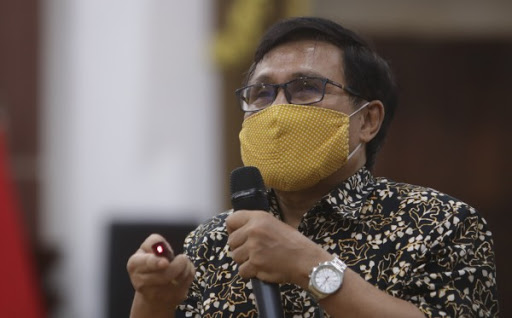UNAIR NEWS – In the beginning of 2021, Indonesia experienced another surge in confirmed cases of Covid-19. On Sunday, January 10, 2021, there were 9,640 new positive cases recorded. So the total positive cases in Indonesia exceeded 828,026.
Therefore, the government has re-imposed the PSBB policy, or what is now called as the Enforcement of Community Activities’ Restrictions (PPKM) in Java-Bali region on January 11-25, 2021. Expert in Epidemiology Biostatistics, Universitas Airlangga (UNAIR), Dr. Windhu Purnomo, dr., MS., said that the policy was appropriate to suppress the transmission of the Covid-19 virus. However, there are some points to be considered. Limiting community mobility can be an effort to prevent the transmission of viruses that can easily be transmitted through close interaction.
The man who became the initiator of the PSBB Advocacy & Covid-19 Surveillance Team of Faculty of Public Health UNAIR said that the implementation of PPKM should be carried out simultaneously throughout Java-Bali. This is intended to reduce the total transmission of Covid-19.
“If we want to limit the movement, we really have to do it in all regions of Java, Madura and Bali. For example Surabaya, it is implementing PSBB but other regions do not do the same, later DKI Jakarta will implement it but but Bekasi and Depok do not implement PSBB, it’s useless. So, it means that PSBB is called partial and there will be transmission like ‘ping-pong’ effect or simply the transmission will go back and forth, “Windhu explained.
Windhu said that if the restrictions were implemented in a certain area and the movement continued, only the essential sectors should be allowed to carry out activities, sectors related to basic needs and gas stations as energy providers for logistics distribution.
“But in reality, it is planned to enforce curfew at 7pm. Restaurant is limited, only 25 percent of people can dine in. Only 50 percent of the prayers are in church and mosques. The non-essential sector is still open and the movement continues, “said the lecturer at Faculty of Public Health UNAIR.
For him, PPKM is an option, if it is not implemented, it is fine. However, the government must detect as many cases as possible through testing and tracing which is currently very weak. That way, the transmission will be well controlled because it has been detected.
“Currently, there are many undetected cases below the surface, only the tip of the iceberg is announced. Indonesia yesterday announced that there were 9000 cases per day, is it really only 9000 Indonesians in society, maybe 5 to 10 times more than that actually. But we are unable to detect it because our testing is low, our tracing is bad, “he explained.
Furthermore, there is also an equally important task, restoring public discipline by controlling 3M health protocols: washing hands, wearing masks, maintaining safe distance. Also, create a community movement by empowering existing cadres, such as Family Welfare Empowerment (PKK) cadres, health cadres, and Family Planning (KB) cadres.
Community movements are carried out to remind each other among communities. So, the handling of the Covid-19 outbreak is a community movement that is not just a government program. (*)
Author: Asthesia Dhea Cantika
Editor : Binti Q. Masruroh





